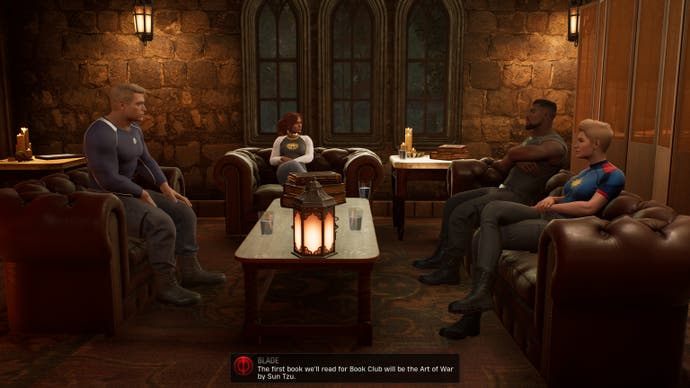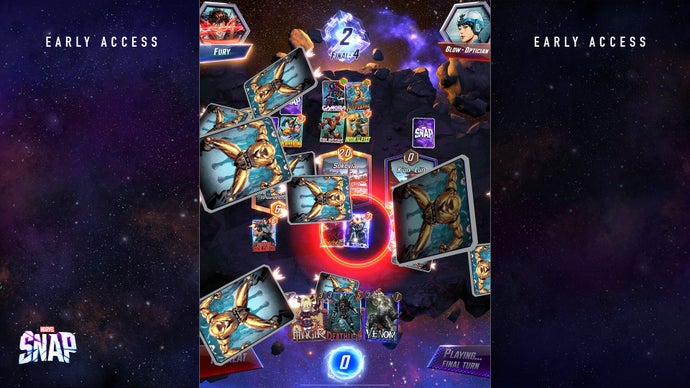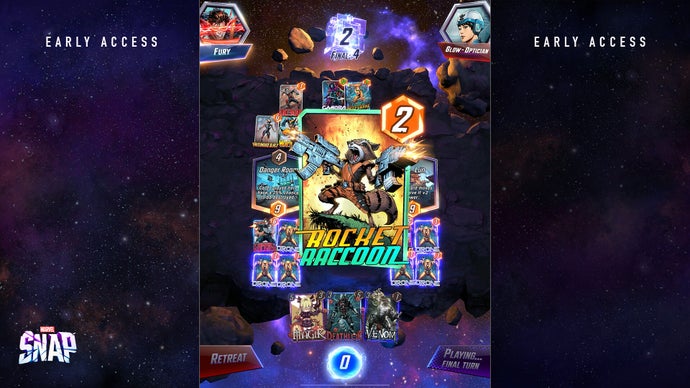I love Uatu, the Watcher. I love to reference him in conversations. I like to use him in elaborate Marvel-themed analogies when winning arguments. I love to put him in articles, although he often gets edited out. Uatu is one of my favourite Marvel characters. I am Uatu 4 Life.
Now, if you play Marvel Snap, the collectible card game based on Marvel’s heroes, you’ll know that there’s an Uatu card in there. He’s interesting, too. Uatu comes with one cost, two power, and when he’s in your deck he reveals the right-most location to you at the start so you can plan ahead a little. Uatu’s one of the first cards people generally get to play with, and he speaks in a cool voice when you use him, and the reveal effect is nice and dramatic. But there’s a problem. He’s not a junk card, but he’s a card you should probably move past pretty early on in most cases. There are better cards out there that do more useful things and give you a bit more bang in the early game.
Here is my specific problem, though. As an Uatu mega-fan, I am never going to not use him. And this means that my deck basically has one fewer functional slots than most people’s decks. Call it fan tax: a seat is always reserved for Uatu, and so my other cards have to work around him.
I was discussing this with a friend this week after Eurogamer’s Katharine Castle published a great interview with Jake Solomon, formerly of Firaxis, and the man who lead the team behind Marvel’s Midnight Suns. Like Marvel Snap, Midnight Suns is another Marvel-themed tactics game in which you choose a load-out of your favourite heroes and get in fights. There are cards in play, but you have to consider character placement in 3D levels, rather than at three different locations as in Marvel Snap. You also have a whole other half of the game where your heroes house-share between missions and bicker, watch TV, go on walks and even start a book club.
It’s a great game, but once again the fan tax is in play for me. I love Blade, and that means if I can take Blade out on a mission, I’m going to. And that’s regardless of whether he works well with the rest of the team and whether he needs levelling up and any of that stuff.
The fan tax is less of a problem in Midnight Suns than it is in Marvel Snap. Firaxis does a number of things to make sure you use a wide range of heroes, and it encourages you to put time into them in different ways. But I still skew towards Blade in a way that makes me neglect other heroes more than I should. Just as I still find room for Uatu and a few other favourites in my deck, when I could really be using more of my Marvel Snap cards.

Let’s flip it, though. Maybe this isn’t a problem. Maybe it’s one of the world’s greatest licenses actually making these games more interesting. Both Marvel Snap and Midnight Suns get a lot from Marvel. Alongside name recognition and a hefty backlog of lore, the heroes also guide the designers when it comes to thinking of powers and synergies and even mission designs in the case of Midnight Suns. Both games would be less colourful and potentially less creative without heroes who most players are aware of, but who still have quirks that make a designer stretch themselves a little to create tactical interpretations of them.
Talking to Eurogamer a while back, Marvel Snap’s Ben Brode actually spoke about this. He talked about how card designs are often either top-down or bottom-up, because the art is at the top and the text is generally at the bottom. A top-down approach starts with Uatu, say, and says, what should Uatu’s card to? (It should RULE.) A bottom-up approach starts with saying, oh, we want to do more cards that clone other cards. How should that work, and then who might be suited to it?
I was particularly interested in what Brode says about top-down:
“But going top-down really expands your brain,” he says in the piece. “As in… What would Mirage, who causes hallucinations, do? What would she do in this game? Or what would Mysterio do? Thinking like that, you’re not thinking about mechanics, you’re thinking about delivering on a fantasy and some of the craziest designs come from that.”


I suspect that fan tax works the same way. It’s using Marvel’s lore and ideas to – perhaps unintentionally – limit me as a player, and in a tactics game, limitations are often really interesting, because they make you do new things, they make you work around things, they make you creative in ways you wouldn’t normally be. They make you think.
So now when I look back on Midnight Suns, I think of all the times I managed to squeak a victory with Blade even when nobody else would have taken him out that day. In Marvel Snap I can look back on a long line of – admittedly slightly odd – Uatu victories, which are all the sweeter because they would not have unfolded like that if I was building a deck based on the head rather than the heart. I’ve always known Marvel’s so suited to tactics games because its heroes do specific things, they have specific powers and specific weaknesses and they can be combined and anticipated and all the things you need for a tactics game. But now I’ve realised there’s more. They’re so suited to tactics games in part because we love them in specific ways, too, which means we favour one hero when we shouldn’t, and ignore another hero when we should really be taking them along. They make us temporarily act against our own interests because of love – and that sounds pretty superheroic to me.
